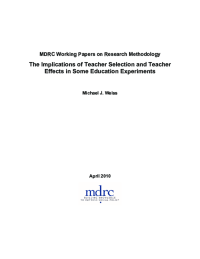The Implications of Teacher Selection and Teacher Effects in Some Education Experiments
In some experimental evaluations of classroom or school-level interventions it is not practically feasible to randomly assign teachers or schools to experimental conditions. Given such restrictions, researchers may randomly assign students to the program or control group and consider the teacher or school to be a part of the intervention. However, in an individually randomized evaluation of a classroom or school-level intervention, unless teachers or schools are randomized to experimental conditions, it will not be clear whether measured differences between program and control group students are a result of the core components of the intervention or a result of the teachers (that is, teacher effects). This working paper clarifies the interpretation of typically calculated “program impacts” in this situation. In addition, using the magnitude of estimated teacher effects from past research, this paper demonstrates that, if teachers or schools are not randomly assigned to experimental conditions, it is significantly more difficult to establish whether the program works or whether the types of teachers selected (or volunteering) to teach in program classrooms are simply more or less effective than their control group counterparts. The significant implications of the correct causal inference to be made are discussed.






